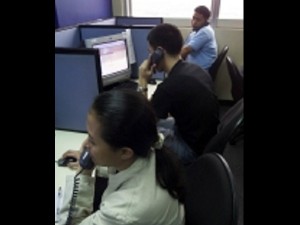PH should not pin hopes on BPO, says think tank

FALSE HOPE? Call centers and other business process outsourcing (BPO) companies in the Philippines are at risk, says independent think tank. INQUIRER file photo
MANILA, Philippines—The Philippine government should not pin too much hope on call centers and other business process outsourcing (BPO) companies as a means of boosting local employment and the economy, warned the independent think tank Ibon Foundation.
Ibon, which advocates nationalist industrialization, said United States President Barack Obama’s recent statements calling outsourced jobs back to the US highlighted the risk of relying on BPOs.
Ibon warned of this and other adverse trends facing the BPO sector, adding that the money that the government intends to spend to promote it would be better used to support Filipino industry and science and technology.
The Philippines is a popular location for call centers and other outsourced services, and has edged out India as the world’s leading BPO center. Some government leaders have even gone so far as to suggest that education be geared toward providing the manpower for BPOs.
In a statement, Ibon Foundation noted the government had set aside P575 million in subsidies for private foreign BPO investors, with the money going to training, curriculum and teacher development, career marketing and scholarships.
It could think of better ways to spend the money, Ibon said.
“These funds are more productively spent supporting Filipino industry, science and technology than for a sector that is such a small part of the economy and by its nature will never give much added value,” it said.
“The BPO sector is barely integrated into the local economy outside of its relatively few jobs and so does not stimulate or encourage domestic production,” it added.
According to Ibon, Obama’s move to bring outsourced jobs back to the US underscores the dangers of relying on BPOs and foreign economies for jobs for Filipinos.
“Even if it is still unclear if President Obama’s proposed ‘insourcing’ legislation will pass, the vulnerability of the sector and the government’s misplaced attention to this is increasingly apparent,” it said.
The Business Processing Association of the Philippines (BPAP) said, however, that it was not alarmed and noted that outsourcing had allowed US companies to survive and grow amid the global financial crisis.
Ibon countered that even if Obama’s “insourcing” plan —which some dismiss as an election ploy—does not come to pass, the BPO industry is nevertheless facing setbacks.
“(Obama’s) initiative is just another example of adverse trends facing the sector and more of this are likely to emerge as the crisis in the US and the rest of the world worsens in the coming years,” it said.
The BPO sector has been growing, but the group said this had slowed slightly. It said the 21.9-percent growth in BPAP-related jobs in 2011 was slightly slower than the 24.1-percent growth in 2010. The 22.5-percent growth in revenues was also slower than the 25.3-percent growth in 2010.
It also said that government and industry estimates for the BPO industry at 1.3 million jobs and $25 billion in revenues in 2016 was too optimistic. It noted that an earlier plan to generate one million jobs and $12 billion in revenue in 2010 fell short of the target. Only 525,000 jobs and $8.9 billion in revenue materialized, it said.
Ibon further said that the slowing global and US economy appeared to have affected the BPO industry, despite reports that the Philippines had overtaken India as the world’s leading BPO center.
“Developments in the US economy are particularly relevant because the latest Bangko Sentral ng Pilipinas data notes that the US accounts for 72 percent of foreign investment and 80 percent of BPO service exports,” it said.
It also noted that the deployment trend of Filipino nurses in the US dropped between 2008 and 2010, and Obama had campaigned for prioritizing American nurses over migrants. The US congress has already approved a bill that would reduce the number of visas allowed for temporary registered nurses.














